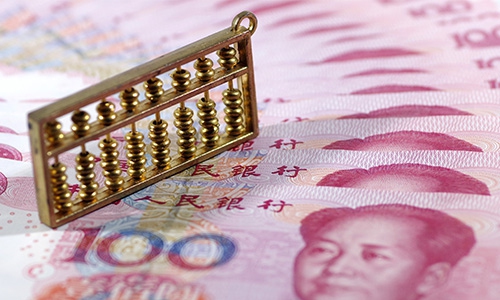
Renminbi Photo: VCG
The People's Bank of China (PBC), the country's central bank, on Wednesday conducted reverse repurchase operations to inject a total of 21 billion yuan ($2.98 billion) into the market, in a bid to maintain stable liquidity in the banking system at the end of the quarter.
The operations included 2 billion yuan of seven-day reverse repos at an interest rate of 2 percent, and 19 billion yuan of 14-day reverse repos at an interest rate of 2.15 percent, according to a statement on the website of the PBC.
It was the third consecutive day that the central bank carried out reverse repos. It conducted 26 billion yuan of reverse repos on Tuesday and 12 billion yuan on Monday.
Market liquidity has been rather tight recently due to several factors, as some debts of local financing platforms are approaching maturity and China's exports have grown more slowly recently, Sun Lijian, director of the Financial Research Center at Fudan University in Shanghai, told the Global Times on Wednesday.
China's exports stood at $314.9 billion in August, up 7.1 percent year-on-year, 10.9 percentage points slower than the pace in the previous month, according to data from the General Administration of Customs.
The PBC's reverse repos show that the central bank has maintained an independent stance to stabilize liquidity levels so as to support the economic recovery, despite a growing air of panic in global financial markets ahead of a possible interest rate hike on Wednesday (US time) by the US Federal Reserve, an analyst said.
Against the backdrop of the US and many other major economies tightening liquidity, the PBC's move showed that China has been able to stick to its own rhythm and meet the needs of its own economic development, even though the hawkish Fed policy is mounting pressure on the markets, Sun said.
Behind these independent steps, Sun cited China's resilient economic fundamentals and the nation's effective foreign exchange management. Unlike the situation in some countries in Southeast Asian and East Asian countries, China has seen no massive withdrawal of foreign capital so far, Sun noted.
While the yuan has weakened against the surging US dollar recently and China's stock market has dropped as some foreign capital left the market, the overall scale remained small, he added.
The central parity rate of the yuan weakened 68 basis points to 6.9536 against the US dollar on Wednesday, according to the China Foreign Exchange Trade System.
China's A-share market closed lower on Wednesday, with the Shanghai Composite Index down by 0.17 percent, the Shenzhen Component Index down by 0.67 percent and the ChiNext Index (Growth Enterprise Market Index) losing 1.49 percent.
The amount of "Northbound capital" - foreign money flowing into China's A-share market through Hong Kong - saw a net outflow of 3.06 billion yuan on Wednesday. Still, it recorded a 4.32-billion-yuan net inflow in the most recent 30 trading days.
Despite mounting pressure, the stock market hasn't seen any massive withdrawal of foreign capital, and data on direct investment in China by overseas investors showed no intention to leave the market, Sun added.
China's actual use of foreign capital rose 20.2 percent year-on-year in US dollar terms to $138.41 billion from January to August, with investments from South Korea, Germany, and Japan leading the way, data from the Ministry of Commerce showed on Monday.
"All these developments have made space for China to roll out monetary policies based on its own needs, instead of outside pressure," Sun said.
Global Times




